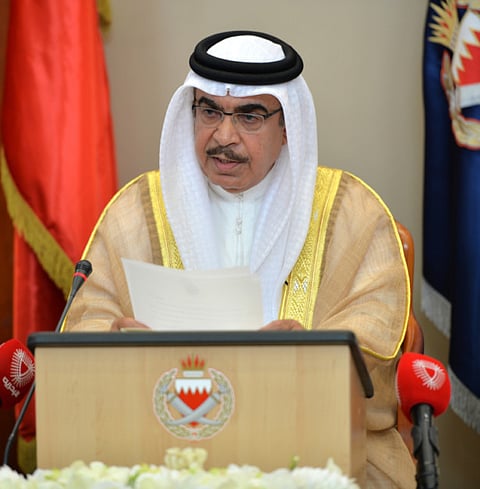Bahrain says Iran promoting sectarian tendencies
Kingdom unveils new rules to prevent young people travelling to conflict zones

Manama: Bahrain has accused Iran of resorting to sectarian excuses to explain its interference in the kingdom’s domestic affairs.
“With regards to Iranian interference in our internal affairs, if the alleged reason is that Iran cares about the situation of Shiites in Bahrain, this is an unacceptable sectarian excuse,” Shaikh Rashid Bin Abdullah Al Khalifa, the Minister of Interior, said. “Bahrainis are all equal under the constitution and the law. We do not have second-class citizens. The Shiites of Bahrain feel that they are second class only when they are in Iran, especially if they are of Arab origin,” he said.
Shiites of Iranian origin who have been granted Bahraini citizenship no longer have political links with Iran, Shaikh Rashid added. “In general, Shiites hold Arab, Islamic and foreign nationalities. And I am sure you are aware of what has happened to countries, especially Arab states, that have come under the influence of Iran,” he told a local community gathering that brought together religious scholars, members of the Council of Representatives and the Shura Council, representatives of human rights organisations, editors-in-chief, journalists, businessmen, lawyers, doctors, and heads of sports clubs and youth centres among others.
Bahrain has often asked Iran to put an end to its interference in its internal affairs and to live up to the United Nations standards of mutual respect between countries, particularly neighbours.
Iranian officials have repeatedly made statements pledging that they were ready to support “the people of Bahrain”. Touching on the topic, Shaikh Rashid said: “If Iran has sought through its interference to create a Shiite dimension in the region, it had in fact created unstable surroundings that do not serve its goals. The matter has become clearer today thanks to the media openness.”
The minister said that a draft law against discrimination, hatred and sectarianism would soon be presented to the government for approval.
The new law has become significant in light of Sunni and Shiite extremism prevailing in the region, he added.
“We need to contain everything that could lead to divisions and hatred within our nation. We need to adopt a patriotic approach that celebrates our national identity and reinforces the values of tolerance and acceptance of others, so that everyone emerges a winner,” Shaikh Rashid said.
Other measures being considered by the ministry include a new set of general regulations and rules for travel by people under the age of 18 to conflict areas and a clear separation between the religious and political discourses.
“I stress the importance of protecting religious speeches from political speeches that can incite sectarianism,” Shaikh Rashid said. “It is important to work with those who deliver sermons to make them aware of their important role and to help them understand why they should not be members of political societies,” he said.
Imams who deliver sermons must be appropriately qualified and must hold valid licences, the minister said.
Shaikh Rashid said that while the security situation in Bahrain has vastly improved, there was a need to enhance the approach that has made the progress possible.
“We thank God for the overall positive situation in Bahrain, which is the result of much work by the government along with the cooperation of citizens and residents to protect the security and stability of the nation,” he said. “In this context, we continue the approach that has been responsible for improving our general situation and addressing our shortcomings that were exploited over the years to negatively affect our national security.”



